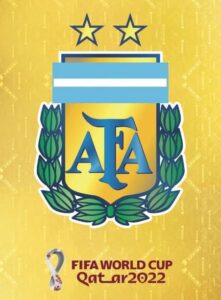2022 World Cup – Thursday 01 December 2022
 Group D:
Group D:
Tunisia 1 (0) – (0) 0 France (Education City Stadium, Al Rayyan)
Tunisia scorer: Khazri (58’)
France had already qualified going into the final round of games, with Australia second on three points and Tunisia and Denmark bringing up the rear with a point apiece.
Tunisia knew that only a victory would give them any chance of progressing to the last sixteen and they would have been heartened by the rotation to the French squad that saw players like Lloris, Griezmann, Giroud and Mbappe on the bench. In what was to prove an emotional and highly charged atmosphere given the historical and political links between the countries. Despite a lack of possession. Tunisia held their own and then struck just before the hour mark, winning the ball in midfield releasing ex-Sunderland player Khazri to advance on the French defence before slotting into the corner. Didier Deschamps the French coach reacted by throwing on his big guns in search of an equaliser, but it was not to be with Griezmann having his late strike disallowed for offside. Tunisia had secured the win they required, but with Australia beating Denmark it was the Socceroos who took second spot and a place in the last sixteen.
Australia 1 (0) – (0) 0 Denmark (Al Janoub Stadium, Al Wakrah)
Australia scorer: Leckie (60’)
The equation was a simple one for both teams, win and progress. The Danes dominated possession but didn’t convert this into shots on goal and when they did they couldn’t find a way past Mat Ryan in the Australian goal. The vital goal came on the hour, as Australia broke with a lightning-quick counterattack finished off by Mathew Leckie.
For the Danes their Semi-Final spot at the Euros seems a lifetime away as they struggled in Qatar, gaining just a point. For Australia, progressing equals their best tournament in 2006 when they lost in last sixteen to a Italian penalty in time added-on.
 Group C:
Group C:
Poland 0 (0) – (0) 2 Argentina (Stadium 974, Doha)
Argentina scorers: Mac Allister (46′), Alvarez (67′)
Going into the final round, Poland topped the group (4 points), with Argentina second who were level on points with Saudi Arabia and Mexico last with a solitary point.
Yet again VAR and those who adjudicate to be frankly embarrassing. The awarding of a penalty to Argentina on 39 minutes was simply comical. Poland keeper Wojciech Szczesny has his eyes on the ball as he attempts to punch/palm the cross away, the contact between his hand and Messi’s face is an accident…and then the acting from Messi for the ‘contact’ – well don’t get me started. Thankfully justice was done as the ex-Arsenal ‘keeper clawed away Messi’s spot-kick. No goals at half time – jeez how many times have I typed that during this World Cup.
Within a minute of the restart though they had their goals with Mac Allister’s shot going in off the post. When Alvarez scored with twenty-three minutes remaining to make it 2-0 and the score over in Lusail, having started top the Poles were in danger of missing out on second spot. Indeed they were ragged in the last quarter of the game and can be grateful for Argentina’s profligate finishing which could have sent Poland home. Argentina recovered from the defeat against Saudi Arabia to finish top of the group and finding a bit of a groove.
Saudi Arabia 1 (0) – (0) 2 Mexico (Lusail Iconic Stadium, Lusail)
Saudi Arabia scorer: Al Dawsari (90’+5’). Mexico scorers: Martín (47′), Chavez (52′)
Mexico despite victory missed out on the last sixteen on goal-difference. They were ahead 2-0 after fifty-two minutes, the second a stunning free kick from Chavez. And as they went in search of more goals, the situation though in the group took some understanding (and believing). With Argentina beating Poland 2-0 and Mexico leading by the same score-line at Lusail Stadium in the fourth minute of time added on, El Tri (The Tricolour) needed one more goal to prevent them from going out according to FIFA’s fair play rule for having more yellow cards than Poland. However, this didn’t come into play as Salem Al Dawsari’s goal in the fifth minute of time added-on sent Mexico home on goal difference instead. Some drama at least in a World Cup that has yet to burst into any sort of life.
 If Luka Modric had a bucket list, it would surely read something like this: play in the Premier League (tick), become a Galactico (tick), win the Champions League (tick), lead Croatia to their best ever result at a World Cup (tick), win the Ballon d’Or (tick). After all that, there was only one thing left for Croatia’s most capped player to tick off – write an autobiography – and it’s now mission accomplished.
If Luka Modric had a bucket list, it would surely read something like this: play in the Premier League (tick), become a Galactico (tick), win the Champions League (tick), lead Croatia to their best ever result at a World Cup (tick), win the Ballon d’Or (tick). After all that, there was only one thing left for Croatia’s most capped player to tick off – write an autobiography – and it’s now mission accomplished. Okay, okay…I should be reflecting on how Germany got themselves out of a hole by beating Sweden with ten-men with a last gasp fabulous free-kick, in only a way that Die Mannschaft seem to be able to do. And yes I probably should be talking about how Belgium looked frighteningly good in their demolition of Tunisia 5-2 or how Mexico took a giant stride towards progression to the last 16 with a 2-1 victory over South Korea.
Okay, okay…I should be reflecting on how Germany got themselves out of a hole by beating Sweden with ten-men with a last gasp fabulous free-kick, in only a way that Die Mannschaft seem to be able to do. And yes I probably should be talking about how Belgium looked frighteningly good in their demolition of Tunisia 5-2 or how Mexico took a giant stride towards progression to the last 16 with a 2-1 victory over South Korea. Yesterday saw a Group A fixture between Uruguay and Saudi Arabia and in Group B, Portugal v Morocco and Spain v Iran with all seemingly having come under the influence of the Arsenal coaching manual circa 1980s from George Graham, as all three games ended 1-0, with Uruguay, Portugal and Spain the victors.
Yesterday saw a Group A fixture between Uruguay and Saudi Arabia and in Group B, Portugal v Morocco and Spain v Iran with all seemingly having come under the influence of the Arsenal coaching manual circa 1980s from George Graham, as all three games ended 1-0, with Uruguay, Portugal and Spain the victors. The three games from yesterday continued to defy what many ‘experts’ had predicted pre-tournament. Tuesday opened with Columbia taking on a Japan side that was derided as very ordinary even by its own fans. Yet at the whistle in the Mordovia Arena, it was the Blue Samurai who had put the South American team to the sword. Japan were greatly helped by the third-minute dismissal of Carlos Sanchez for handling Shinji Kagawa’s shot at a goal, with the resultant penalty converted by Kagawa. Columbia though equalised through a low struck free-kick from Juan Quintero. Some parts of the media lauded it as a ‘clever free-kick’ as it passed under the leaping Japanese wall, for me though, ‘keeper Kawashima really should shoulder some of the blame for the goal. However, Japan were not to be denied victory and a header from Yuya Osako seventeen minutes from time, sealed an opening game win in Group H.
The three games from yesterday continued to defy what many ‘experts’ had predicted pre-tournament. Tuesday opened with Columbia taking on a Japan side that was derided as very ordinary even by its own fans. Yet at the whistle in the Mordovia Arena, it was the Blue Samurai who had put the South American team to the sword. Japan were greatly helped by the third-minute dismissal of Carlos Sanchez for handling Shinji Kagawa’s shot at a goal, with the resultant penalty converted by Kagawa. Columbia though equalised through a low struck free-kick from Juan Quintero. Some parts of the media lauded it as a ‘clever free-kick’ as it passed under the leaping Japanese wall, for me though, ‘keeper Kawashima really should shoulder some of the blame for the goal. However, Japan were not to be denied victory and a header from Yuya Osako seventeen minutes from time, sealed an opening game win in Group H. Here we are again…another World Cup…the 21st staging and the first to be held in Eastern Europe.
Here we are again…another World Cup…the 21st staging and the first to be held in Eastern Europe.